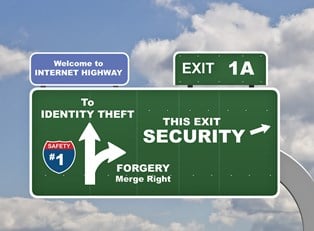Corporate Companies Know You Better Than You Know Yourself
Have you ever noticed that you'll be comparison shopping for a lawn mower on Amazon, and then you start seeing advertisements in your web browser for lawn mowers on Amazon? That's not accidental. Credit card numbers, GPS tracking and direction requests from your phone, and a whole host of other things combine to give businesses a pretty clear portrait of who you are.
Target's collection of your information is tied to your credit card number. They assign you an internal identification number and market specifically to you based on it. They've gotten so good at predicting customer patterns that in one case in 2012, they figured out that a teenaged girl in Minneapolis was pregnant before her father did. Among their statistics is a "pregnancy prediction score" based on years of data collected about what people buy when they first learn they're pregnant -- unscented lotion, extra-large purses, and more. They've even learned how to subtly market to those people in a way that encourages them to take advantage of their pregnancy deals without tipping the hand that they've collected that data.
Target is far from the only company that does this. In fact, the narrative in the business world the last couple of years has been that if you don't use "big data," you're already falling behind the competition. Google Maps makes its traffic analysis and route recommendations based on how many Android users are on a given road, and what their market share is in that area. Companies know more about you than you ever dreamed possible. Which is creepy enough on its own, but can you imagine what would happen if that data got out?
Oh, wait...
Did you know...
- When it comes to counterfeiters, North Korea are pros. They have gotten so good at counterfeiting American currency (particularly the $50 and $100 bills) they their fakes are known as "superdollars." They require specialized Federal Reserve equipment to be identified. There are $45 million worth of North Korean fakes…that we know of.
- Want a money saving tip? Ditch credit and debit cards, and stick to carrying around cash. Studies show people spend between 12 – 18% more when using a plastic card as opposed to when paying for things in cash. If you physically have to dole it out, you’re much more aware that you are spending your hard-earned money!
- Paper money is actually pretty heavy. One pound would be worth $454 in $1 bills. That means $1 million comprised solely of $100 bills would weigh over 20 pounds. Those suitcases filled with money in movies must be hefty to lug around all that paper money. If you plan on robbing a bank, you better bulk up!
- It's an understatement to say that the odds when playing the lottery are not in your favor. You are statistically three times more likely to die in a car accident while driving 10 miles to buy a lottery ticket than you are to actually win. Even more astounding, over half the tickets in an average lottery draw are bought by only 5% of the participants.
- The most expensive hotel room in the world (the Royal Penthouse Suite at the Hotel President Wilson in Geneva, Switzerland) costs $83,200 a night. That's $58 per minute for a stay! Good thing it has 12 bedrooms, 12 baths, a wraparound terrace, a Steinway piano, and an assigned private staff (including a chef)!




